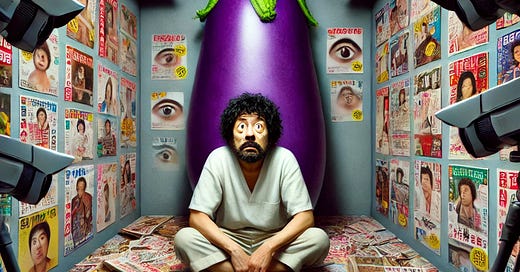So, there I was, deep in a conversation with a friend, when we stumbled upon the burning question: When did the humble eggplant (or aubergine, if you’re feeling fancy) become the universal symbol for male genitalia in the emoji universe? Naturally, living in 2025, with absolutely nothing else to worry about—because the world is in such impeccable shape—I decided this conundrum required some serious investigation. Little did I know, this quest would lead me down a rabbit hole so deep, I’d emerge questioning the very fabric of reality television.
Enter ‘The Contestant,’ a Japanese TV show that’s as wild as a bag of cats on caffeine. It’s insane, ethically questionable, and, dare I say, bloody brilliant. Before reality TV became the voyeuristic juggernaut we know and love (or loathe) in the West, Japan was already knee-deep in hidden camera shenanigans. Since the ’80s, possibly even earlier, Japanese television has been serving up content that makes ‘Big Brother’ look like a tame kindergarten play.
But ‘The Contestant’—oh boy, this one takes the cake. The premise? Stick a man in a tiny room, strip him of his clothes (yes, you read that right), and challenge him to survive by entering magazine competitions to win food, clothing, and, well, his sanity. Oh, and did I mention they filmed the whole ordeal and broadcast it on national TV without his knowledge? Talk about a plot twist.
The star of this social experiment was Tomoaki Hamatsu, affectionately nicknamed ‘Nasubi’ (which means ‘eggplant’ in Japanese, but more on that later). Nasubi was an aspiring comedian who thought he was auditioning for a regular TV gig. Instead, he found himself isolated in a bare apartment, tasked with winning ¥1 million (about $8,000) solely through mail-in sweepstakes. Clothing? Nope. Food? Only if he won it. Privacy? Not a chance. Unbeknownst to him, his every move was being broadcast to millions of viewers, turning his life into a national spectacle.
For over a year—yes, 15 grueling months—Nasubi lived in this bizarre limbo, his only connection to the outside world being the magazines he scoured for contest entries. He endured isolation, starvation, and the psychological toll of his predicament, all while the audience watched, riveted. His diaries, chronicling his experience, became bestsellers, and the show broke viewership records, with 17 million people tuning in each Sunday night. It’s like ‘The Truman Show,’ but with a darker, more twisted edge.
Fast forward to today, and Hulu has released a documentary aptly titled ‘The Contestant,’ which delves into this mind-boggling tale. The film features interviews with Nasubi himself, as well as the producers behind the original show, offering a glimpse into the madness that unfolded. It’s a fascinating watch, prompting us to reflect on the ethics of reality TV and our insatiable appetite for voyeuristic entertainment.
Now, you might be thinking, “Well, that’s Japan for you—always pushing the envelope.” But before we get too high and mighty, let’s not forget our own forays into ethically dubious entertainment. Remember ‘Survivor,’ where contestants are marooned on an island, forced to outwit, outplay, and outlast each other for a cash prize? Or ‘Big Brother,’ where individuals are confined to a house, their every move monitored for our viewing pleasure? And who could forget ‘Fear Factor,’ where participants faced their deepest fears (and often gag-inducing challenges) all in the name of entertainment? These shows, while not as extreme as Nasubi’s ordeal, still toe the line between captivating content and ethical ambiguity.
So, what does this all say about us as a society? Perhaps it’s a reflection of our collective fascination with the human condition—the lengths people are willing to go for fame, fortune, or simply survival. Or maybe it’s a mirror held up to our own lives, a way to escape our mundane realities by immersing ourselves in the extraordinary (and often absurd) experiences of others. Whatever the case, ‘The Contestant’ serves as a stark reminder of the power of media and the fine line between entertainment and exploitation.
As for the eggplant emoji’s phallic association, perhaps it’s a nod to Nasubi’s (the man and the vegetable) naked ambition and the raw, unfiltered nature of his televised ordeal. Or maybe, just maybe, it’s a testament to our ability to find humor and symbolism in the most unlikely of places. Either way, the next time you see that purple vegetable pop up in your messages, you’ll have a story to tell—a tale of isolation, endurance, and the wild world of reality TV.
Now, just to be clear, this isn’t some sneaky promo for the Hulu documentary. I don’t even live in a country where I can legally watch Hulu, but credit where it’s due—this trailer is a pretty good visual representation of the absolute madness this TV show put on screen.
For a visual glimpse into this extraordinary story, check out the official trailer for ‘The Contestant’ below:
And if you’re curious to dive deeper, ‘The Contestant’ is available for streaming on Hulu if you live somewhere that’s available? If not, I'm sure it's available by some other dubious means. It’s a wild ride that will leave you questioning the very nature of reality and entertainment.
🍆🍆🍆🍆🍆🍆🍆🍆🍆🍆🍆🍆🍆🍆🍆🍆🍆🍆
The Meme Lords: How Two Kiwis Shitpost Their Way to Power
Topham Guerin: proving that in the battle of clicks, quality doesn’t matter when you’ve got memes.







